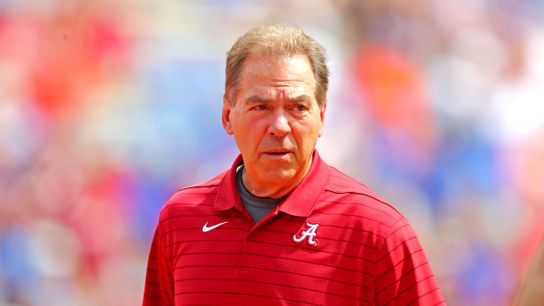No one puts more players in the NFL than Nick Saban. At the opening day of the 2018 season, 44 Crimson Tide players dotted NFL rosters, the most in the nation. According to a 7-round mock draft posted by The Athleticon Monday, 11 more will join those 44 later this month.
So, if anyone could use the NFL as a recruiting pitch, it's Saban. This is why the next sentence is important, so important that it gets its own paragraph break:
Nick Saban is no longer using the NFL to pitch recruits.
Again, the coach who made these two graphics possible is no longer using the NFL to pitch to recruits.
Every player wants to play in the NFL, and most of them think they will. Those good enough to garner Alabama's attention certainly think they're destined for the NFL, probably for a decade at least.
So, why wouldn't Saban pitch the NFL to recruits when he's fielded an entire 11-man lineup on offense and defense exclusively with future NFL players? Why is the one water bottle salesman in the desert no longer selling water to thirsty people?
"I've actually changed how I talk to recruits now," Saban said Saturday. "The reason that you're going to college is to prepare yourself for the day you can't play football. I think we have a lot of people way back in high school that look at college as a conduit to get to the NFL."
Saban cited a statistic that said 380 or so players declare for the NFL draft in the past five years; 103 declared this year, down slightly from the 106 in 2018. One in four will not get drafted, and another 25 percent failed to last three years in the NFL.
He brought up the example of Ronnie Harrison -- Saban didn't single him out by name, but it wasn't hard to figure out who he was talking about -- a 2017 All-SEC safety who forgo his senior season to enter the 2018 NFL Draft. Harrison was selected 93rd overall by the Jacksonville Jaguars; he signed a 4-year contract worth a sum of $3.4 million with an $800,000 signing bonus. However, Saban said Harrison would have had a shot at becoming the first safety selected in the 2019 Draft had he returned to school. The first safety selected in 2018 was Harrison's own Alabama teammate, Minkah Fitzpatrick; he signed a 4-year deal worth $16.5 million with a $10 million signing bonus.
"People have to be smart about the business decisions they make relative to the NFL because it is all business," Saban said. "When people make emotional decisions, they’re going to have to suffer some really difficult consequences for themselves in the future because you don’t have to go out for the draft early. You can come back and play."
To boil it down to one sentence, Saban no longer pitches the NFL because his players are so talented that they're often so tempted by the 50 cents they can earn right now they don't have the foresight to wait for the dollar bill waiting for them around the corner.
Suffice to say, that's a different approach than, say, Tim Lester makes at Western Michigan. But either way the point is the same: Nick Saban no longer pitches the NFL to recruits.
And if Nick Saban doesn't use future NFL paychecks to woo recruits, it's marks a fundamental change in the way all of us should view college football, even at the highest level of the sport. College football is not a means to an end or a conduit to the NFL, to borrow Saban's term. It is an end unto itself, an opportunity for players to obtain an education that will set them up for life after they've stopped playing football, which, for the overwhelming majority of players, will happen well before their 30th birthday.
To be fair, the majority of college football coaches are already using the "It's a 40-year decision, not a 4-year decision" pitch to recruits. But now the one coach who could get away with not using the 40-not-4 pitch is using the 40-not-4 pitch.
A college scholarship is, at its core, not a ticket to NFL wealth, but instead a tool to acquire an education that you will need to support yourself for the rest of your life after you can no longer play football. Yes, even at Alabama.
